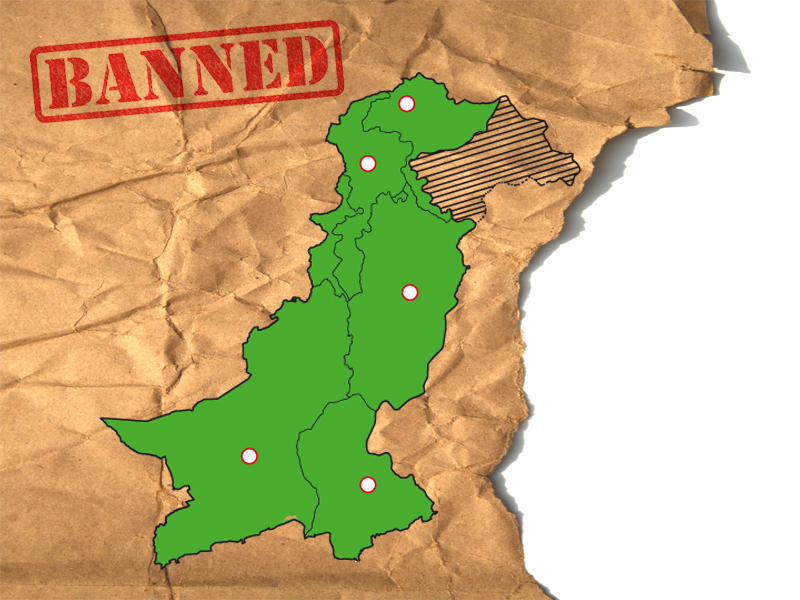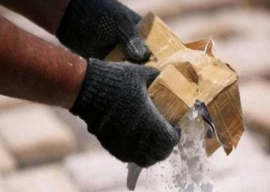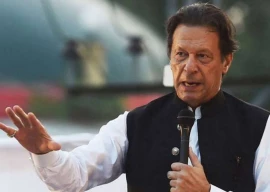
Ever since Pakistan became a frontline state in the US-led war against terrorism in 2001, it has lost a staggering 49,000 of its people.
To add to these appalling figures, it was revealed recently that the number of organisations banned by the government have almost doubled during the last two years. The latest figure soared to 59 as the Interior Ministry banned 28 terrorist groups during the last 20 months.
Out of the total number of proscribed militant outfits, 59 are completely banned by the Government of Pakistan, three organisations in the country are named in the al Qaeda Sanctions List – maintained by the United Nations Security Council Committee that oversees sanctions imposed on individuals and entities associated with al Qaeda – while the Sunni Tehreek is ‘under strict watch’. That brings the total number of organisations of the list to be at 63.
Meanwhile, more than two dozen outfits, including the Jamaat ud Dawa, are pleading their cases in court, appealing against the imposed ban.
There are two aspects to this increasing number of banned groups: one, the distending number of militant, terrorist groups; and two, the measures being taken by the government towards de-legitimising these outfits in a bid to isolate them and apprehend members.
However, these proscribed organisations find a way around such gagging measures. Many have cosmetically changed the name of their outfit and are now operating under new ones. Along with changing their names, some are also operating as a political, charity or religious wing of a political or religious party. For example, Jamaat ud Dawa is a political front for Lashkar-e-Taiba. Similarly, Khuddam-ul-Islam is reportedly a restructuring of the Jaish-e-Muhammad.
Still, the government has also been imposing bans on the renamed fronts of proscribed outfits, which partly explains the rise in bans imposed.
Nonetheless, terrorist, militant and/or separatist groups keep springing up. “It is clear that the emergence of an intense, multinational war in Afghanistan, a safe haven straddling the border, and Pakistan’s role in the war on terror has (and continues to) induce growth in militant groups,” said Tom Sanderson, the co-director of the Transnational Threats Project at the Centre for Strategic and International Studies, a think tank in Washington, DC.
“We should not ignore a secondary cause, which is the heightened Sunni-Shia confrontation that may have led some groups to emerge or expand,” he explained. Overall, it is the presence of outside forces in Afghanistan that stimulates the growth of militant groups in Pakistan, Sanderson concluded.
The Government of Pakistan, in an attempt to quash the growth of these organisations, imposes a ban under The Anti-Terrorism Act of 1997. According to the law, once an organisation is declared proscribed, all its offices must be sealed, its publications and literature seized, addresses and dissemination prohibited and its finances frozen under Article 11-E.
However, organisations were still able to manoeuvre around the law and milk existing loopholes.
Therefore, the law was amended and the Anti-Terrorism (Amendment) Act 2013 expanded the purview of the Anti-Terrorism Courts and instituted clauses to outlaw militant sectarian outfits and freeze their financial assets. The amendment empowered the federal government to ban an organisation “if it has a reason to believe that organisation is concerned with terrorism.”
Former Inspector General Police Naveed Malik observed that a special committee usually headed by Interior Minister or Interior Secretary decides whether the ban should be imposed on an organisation or not. “The growing network of terrorist organisations leads the government to ban the maximum number of outfits involved in suspicious or unlawful activities,” he said.
What happens when an outfit is banned?
According to Article 11-E of The Anti-Terrorism Act, 1997, when any organisation is proscribed:
(1) Amongst other measures to be taken by the Federal Government
a. It offices, if any, shall be sealed;
b. Its accounts, if any shall be frozen;
c. All literature, posters, banners or printed, electronic, digital or other material shall be seized
d. Publication, printing or dissemination of any press statements, press conferences or public utterances on behalf of or in support of a proscribed organisation shall be prohibited
(2) The proscribed organisation shall submit all accounts of its income and expenditure for its political and social welfare activities and disclose all funding sources to the competent authority designated by the Federal Government.
Outfits banned in Gilgit-Baltistan
- Gilgit and East Turkmenistan Islamic Movement
- Khana-e-Hikmat Gilgit-Baltistan
- Tanzweem Naujawanaan-e-Ahle Sunnat
- Anjuman-e-Imamia Gilgit-Baltistan
- Markaz Sabeel Organisation
- Muslim Students’ Organisation
- Shia Talba Action Committee
Baloch separatist groups
- Balochistan Bunyad Parast Army
- Balochistan Liberation Army
- Balochistan Liberation Front
- Balochistan Liberation United Front
- Baloch Musalla Difa Tanzeem
- Balochistan National Liberation Army
- Balochistan Republican Army
- Baloch Republican Party Azad
- Baloch Student Organisation Azad (newly added)
- Balochistan United Army aka United Baloch Army (newly added)
- Balochistan Waja Liberation Army
- Lashkar-e-Balochistan
Top 10: most dangerous terrorist groups
- Al Qaeda
- Tehreek-e-Taliban Pakistan
- Tehreek-e-Jaafria Pakistan
- Sipah-e-Muhammad Pakistan
- Sipah-e-Sahaba Pakistan
- Jamaatud Dawa
- alRasheed Trust
- alAkhtar Trust
- Jaish-e-Mohammad
- Lashkar-e-Jhangvi
Outfits other than TTP in Khyber-Pakhtunkhwa
- Haji Namdar Group
- Jundullah
- Qari Abid group (rival TTP factions)
- Noorullah group (rival TTP factions)
- Waliur Rehman group (rival TTP factions)
- Nizam group (rival TTP factions)
- Tauheed group (rival TTP factions)
Most active in Punjab
- Ahle Sunnat wal Jamaat (also active in Karachi)
- Ansarul Islam
- Hizb ut-Tahrir
- Islamic Students Movement of Pakistan
- Islamic Jihad Union (newly added)
- Jamaat-ul-Furqan (JeM splinter group)
- Jaish-e-Mohammed
- Jamiatul Ansar
- Khairunnisa International Trust
- Khuddam-ul-Islam (former JeM)
- Lashkar-e-Taiba
- Millat-e-Islami
- Millat-e-Islamia Pakistan (new name of Sipah-e-Sahaba)
- Sipah-e-Sahaba Pakistan
- Tehreek-e-Islami
- Tehreek-e-Jaafria Pakistan
- Tehreek-e-Nifaz Shariat-e- Muhammad
- Tehreek-e-Nifaz-e-Aman
Proscribed in Sindh
- Jeay Sindh Muttahida Mahaz
- Peoples Amn Committee
- Lashkar-e-Jhangvi (very active in Karachi)
- Tehreek-e-Taliban Pakistan (very active in Karachi)
Other transnational and local outlawed groups
- Al Harmain Foundation
- Tahafuz Hadudullah
- Islam Mujahideen
- Jaish-e-Islam
- Abdullah Azam Brigade
- Islamic Movement of Uzbekistan
- Islamic Jehad Union (newly added)
- Rabita Trust
New wings of the Tehreek-e-Taliban
- 313 Brigade
- Amar Bil Maroof Wa Nahi Anil
Munkir-Pakistan
- Tariq Geedar Group
- Tehreek-e-Taliban Swat
- Tehreek-e-Taliban Mohmand
- Tehreek-e-Taliban Bajaur
Published in The Express Tribune, October 10th, 2013.
COMMENTS (11)
Comments are moderated and generally will be posted if they are on-topic and not abusive.
For more information, please see our Comments FAQ




1731325890-0/trump-(24)1731325890-0-165x106.webp)












@taibaot: - ignorance is bliss sometimes.
A lot of these groups are still Publicly active with other names. A few names can be taken but its best not to write it as comments. There is no real use of banning organizations if they just change names and still continue to be active. These bans are cosmetic.
@Someone: I am glad you enjoyed it....BOOOM....gotta go man!
@Aakashvani: Nice joke
Taliban and all the outfit organization are the kids and impatient assets of the yesterday army. For decades Pakistan agencies along with foreign support has destroyed the future and lives of millions of kids turns to terrorist; first financing, training and equipped them, have been using them as non-state actors for long at various fronts India, Kashmir, Afghanistan etc. Then after the collapse of their agendas such forces have been started blaming and eliminating through various propaganda and inter, intera-conflicts i.e. establishing and using one group or organization against the other. That definitely increases the number of such organization throughout Pakistan. Mostly they comprised of under age and youngs avoiding them from schooling, brain washing and motivate sentiments against the targeted groups or countries. Today’s devastation is the birth of the army, security establishment.
You forgot to mention the biggest and the most dangerous terrorist groups of all, the Pakistan Army. Although they are slowly being exterminated but unless they vacate occupied kashmir, I am afraid we are not going to stop. We will kill them all eventually but somehow they find a way to surrender. Anyways, until push comes to shove, the Americans are doing a good job in Salala and other places.
After reading this article, if there are 59 completely banned outfits and more are appealing against their ban.......what more terror do the Pakistanis want? All these outfits have a different version of Islam and their raison d etre is based on violence. This interprets to only one opinion that the GOP is caught in a gigantic spider's web. Salams
With such a long list....who the govt should be talking for peace..?
What were the Intelligence Agencies doing when all these terror groups were being formed is the moot question ? How many of these terror groups had their Bank accounts frozen and what was the quantum of funds seized, and number of their offices sealed ? What investigations were carried out of the terror groups accounts to ascertain the source of funds for these terror outfits ? An honest answer to these questions will reveal to the public whether some sections of the Government still consider these groups to be their Assets, for whatever reason.
Don't see a reason why Lashkar a Toiba in the list of banned terrorist groups.
How long will u keep publishing lies and crap ie 49000 people died since 2001 due to terrorism. Pakistani interior minister announced that only 12000 people died due to terrorism incl civvies and military. Come on ET come clean on the numbers. http://www.defence.pk/forums/pakistans-war/274322-war-terror-terrorism-claimed-12-795-lives-says-nisar.html